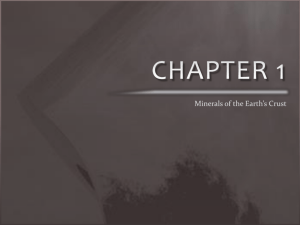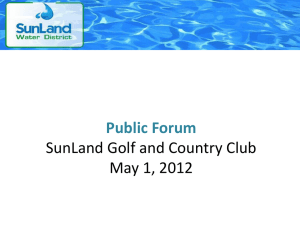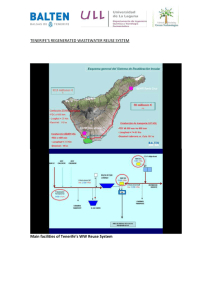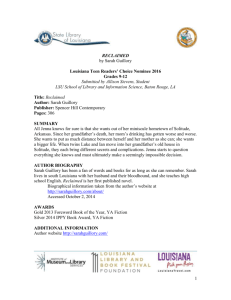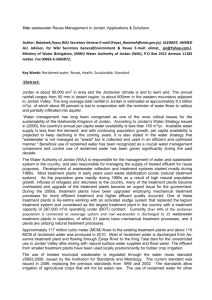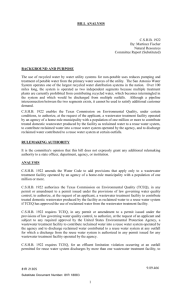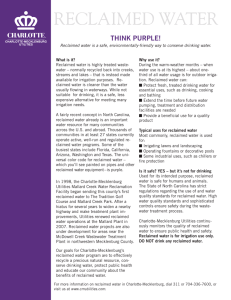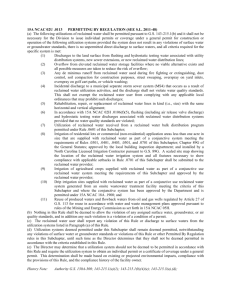210 Water Reuse Authorizations and O&G Development
advertisement
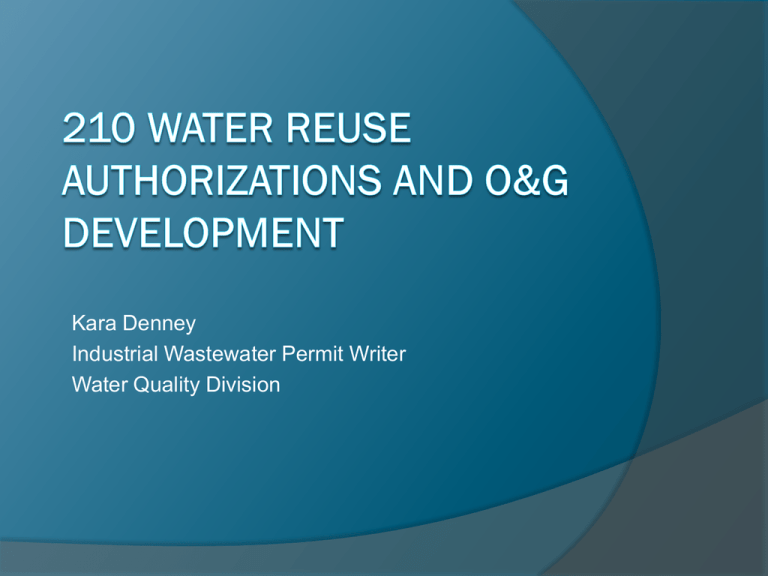
Kara Denney Industrial Wastewater Permit Writer Water Quality Division O&G Water Quality Jurisdictions Memorandum of Agreement: Texas Natural Resource Conservation Commission (TNRCC) and EPA, 1998 SIC codes 1311, 1321, 1381, 1382, 1389, 4922, and 4925 Memorandum of Understanding (MOU): Railroad Commission (RRC) and TCEQ 30 TAC §7.117 adopts, by reference, 16 TAC §3.30 (http://info.sos.state.tx.us/pls/pub/readtac$ext.TacPage?sl =R&app=9&p_dir=&p_rloc=&p_tloc=&p_ploc=&pg=1&p_t ac=&ti=16&pt=1&ch=3&rl=30) Addresses the “cooperation and division of jurisdiction between the agencies regarding wastes that result from, or are related to, activities associated with the exploration, development, and production of oil, gas, or geothermal resources, and the refining of oil” RRC SIC codes 1311- Crude Petroleum and Natural Gas 1321- Natural Gas Liquids 1381- Drilling Oil and Gas Wells 1382- Oil and Gas Field Exploration Services 1389- Oil and Gas Field Services, Not Elsewhere Classified 4922- Natural Gas Transmission 4925- Mixed, Manufactured, or Liquefied Petroleum Gas Production and/or Distribution Which O&G wastewater is regulated where? O&G process wastewater from exploration, production, & transportation RRC Stormwater from O&G exploration, production, & transportation facilities RRC On-site sewage facilities RRC Reuse/reclaimed water (not O&G wastewaters) Water Quality Division Avenues for Reuse at the TCEQ Through an individual permit, either TPDES or TLAP; Wastewater reuse can be authorized through a Chapter 210 authorization; or Directly via the rule in certain circumstances without requiring written authorization Reuse/Reclaimed Water Why Reuse wastewater? Conservation Drought $avings Supply availability Individual Permits TLAP Individual TLAP permit tailored to specific conditions and operations Permit requirements are for the protection of surface and groundwater. TPDES Can include authorizations for reuse activities Chapter 210 Reuse Rules Establishes criteria for the reuse of domestic, industrial, and grey waters. Requirements apply to the Producer, Provider, and User. Signed agreement between Producer and Provider. Examples of reuse Reclaimed water from industrial or municipal effluent and can be used for: golf course and other irrigation activities dust suppression impoundment maintenance makeup water in industrial processes (e.g. cooling tower make-up water), etc. hydraulic fracturing Using Reclaimed Water for Fracturing Municipal Type I Uses Include those that could come into contact with people: Residential and urban irrigation (public parks, golf courses, food crops, etc.) Fire protection, internal sprinkler systems or external fire hydrants. Impoundment Maintenance Toilet or urinal flush water. Other similar activities where the potential for unintentional human exposure may occur. Municipal Type II Includes irrigation or other uses in areas where the public is not present during the time when irrigation activities occur or where the public would not come in contact with the reclaimed water. Wastewater Criteria 30-day Average Parameter Type I Type II (nonpond system) Type II (pond system) BOD5 5 mg/l 20 mg/l 30 mg/l CBOD5 5 mg/l 15 mg/l N/A Turbidity 3 NTU N/A N/A Fecal coliform or 20 CFU/100 ml* E. coli 200 CFU/100 ml* 200 CFU/100 ml* Fecal coliform or 75 CFU/100 E. coli ml** 800 CFU/100 ml** 800 CFU/100 ml** Enterococci 4 CFU/100 ml* 35 CFU/100 ml* 35 CFU/100 ml* Enterococci 9 CFR/100 ml** 89 CFU/100 ml** 89 CFU/100 ml** * 30-day geometric mean ** maximum single grab sample Producer, Provider, & User Producer: A person or entity that produces reclaimed water by treating domestic wastewater or municipal wastewater, in accordance with a permit or other authorization of the Agency, to meet the quality criteria established in the 210 chapter. Provider: A person or entity that distributes reclaimed water to a user(s) of reclaimed water. For purposes of the 210 chapter, the reclaimed water Provider may also be a reclaimed water Producer. Producer, Provider, & User User: Person or entity utilizing reclaimed water for a beneficial use, in accordance with the requirements of the 210 chapter. A reclaimed water User may also be a Producer or a Provider. Producer Responsibilities Transfer reclaimed water of at least the minimum quality required to User; Sample and analyze the reclaimed water and report such analyses (30 TAC §210.34 and 30 TAC §210.36(b); and Notify the executive director in writing within five days of obtaining knowledge of reclaimed water use not authorized by the executive director's reclaimed water use approval. Provider Responsibilities Assure construction of reclaimed water distribution lines or systems (30 TAC §210.25); Transfer reclaimed water of at least the minimum quality required by the 210 chapter at the point of delivery to the User; Notify the executive director in writing within five (5) days of obtaining knowledge of reclaimed water use not authorized by the executive director's reclaimed water use approval; and Not be found in violation of the 210 chapter for the misuse of the reclaimed water by the User if transfer of such water is shut off promptly upon knowledge of misuse regardless of contract provisions. User Responsibilities Use the reclaimed water in accordance with the 210 chapter; and Maintain and provide records as required by §210.36 Volume of reclaimed water delivered to a User or Provider. Quality of reclaimed water delivered to a User or Provider reported as a monthly average for each quality criteria except those listed as "not to exceed" which shall be reported as individual analyses. How to get a 210 Authorization A primary means of disposal is required for authorized Chapter 210 facilities via maintaining a TPDES or TLAP Permit (Producer). Persons who desire to develop projects not included in this rule may apply for a permit. Authorizations are typically processed within 60 days of application submittal. Chapter 210 does not require public notice. Domestic 210 application = $0 Contacts Municipal 210’s Louis C. Herrin III Phone: 512-239-4552 Email: Louis.Herrin@tceq.texas.gov Industrial 210E’s Kara Denney Phone: 512-239-4680 Email: Kara.Denney@tceq.texas.gov
